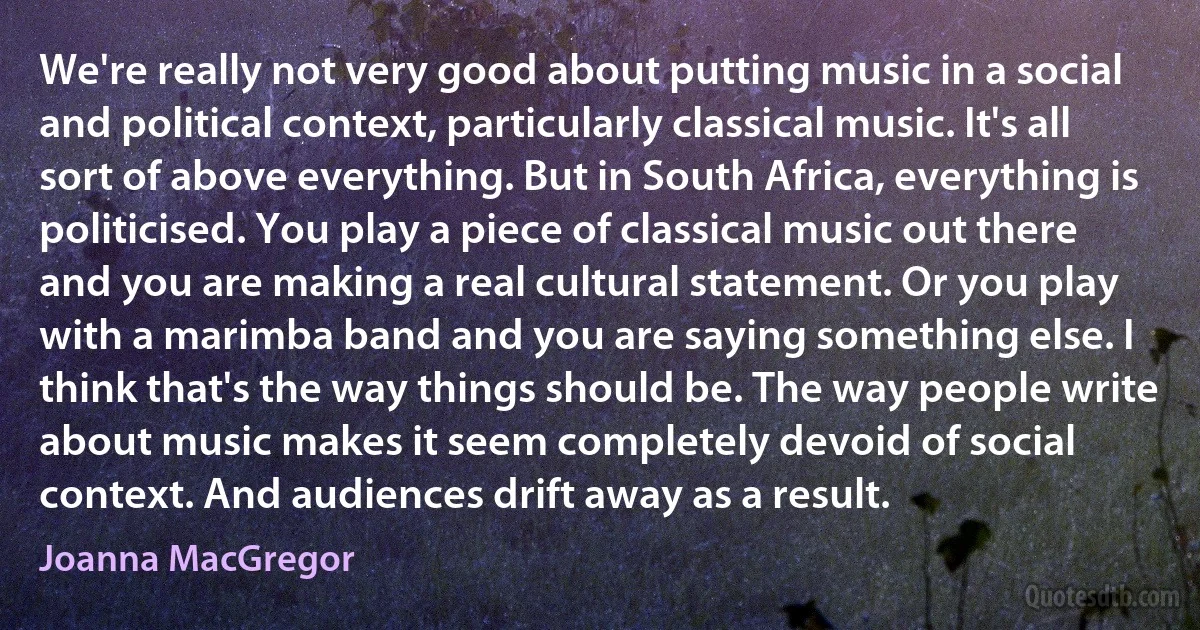Classical Quotes - page 13
I don't really go along with this sense that you sometimes pick up - that is, classical music is superior to everything else. I think classical music is a very great music form, but I can also think of other great music forms. And certainly within each field, you have absolute geniuses operating. Over the years, I've tried to bring together different people from different fields, and I do try to put Bach and Beethoven next to other types of musicians.

Joanna MacGregor
Classical music has struggled to keep up. Unlike any other art form, it keeps on looking backwards all the time. It used to have a real museum culture. Then it went: "Oh my God, what are we going to do? Call for Nigel Kennedy. Quick!" Classical musicians have got to change or die,' she asserts strongly, 'but they just don't know how to. Audiences for classical music have dropped. The old blue rinse audience is dying out, and young people aren't coming in.

Joanna MacGregor
I have absolutely no difficulty in coming out and saying Bach and Beethoven are great composers. You must school young people into great classical music, but you must also allow them to hear other music as well. At one point classical music colonised the high ground. Now we're reaping the backlash for that.

Joanna MacGregor
In a lot of classical playing there isn't much expressiveness: I don't hear a voice in the playing. What I really admire about jazz musicians is that they develop a sound early on and it's unique to them. Classical players are screened from that by always playing other people's notes.

Joanna MacGregor
I'm becoming very interested in non-Western things, and in Europe a lot of what's offered to me is the Western tradition I've grown up with. Now I've got to find a way out, but the problem is that the piano is just about as Western as you can get. The piano's my instrument, and I wouldn't want it any other way, but I'm gravitating quite naturally towards things that have developed my sense of rhythm. "I've come to all this incredible Indian classical music and its more modern formations late in the day; the Messiaen I've played has led me down that road, and I've been following my nose all the time.

Joanna MacGregor
I'm trained quite classically but quite freely by my mum, so even when I was little, I had this rather freewheeling approach. When I trained more seriously in my late teens at college, it was: here are the notes, here is what is expected of you. I didn't mind because you need technique, particularly on the piano, which requires a lot of stamina. And it was natural that once I had done that, I would want to go beyond classical music. How can you be yourself if all you do is reproduce someone else's notes?

Joanna MacGregor
That is why classical Utopias, and the modern dystopias which ironically incorporate their ideals, are static. ... The technically expert citizen is expert only in his allotted task; for him to think about the value of that task is for him to pass completely beyond the limits of what is permissible.

John Passmore
One hears murmurs against Mussolini on the ground that he is a desperado: the real objection to him is that he is a politician. Indeed, he is probably the most perfect specimen of the genus politician on view in the world today. His career has been impeccably classical. Beginning life as a ranting Socialist of the worst type, he abjured Socialism the moment he saw better opportunities for himself on the other side, and ever since then he has devoted himself gaudily to clapping Socialists in jail, filling them with castor oil, sending blacklegs to burn down their houses, and otherwise roughing them. Modern politics has produced no more adept practitioner.

H. L. Mencken
.. the classical aesthetic offers us at the same time a method of thinking and a method of wanting to be, a moral and at the same time a psychology... The classical tradition as a whole, by the logic of the effort and the greatness of results, is in some way parallel with the religious tradition of humanity.

Maurice Denis
The circle of day and night is the law of the classical world: the most restricted but most demanding of the necessities of the world, the most inevitable but the simplest of the legislations of nature.
This was a law that excluded all dialectics and all reconciliation, consequently laying the foundations for the smooth unity of knowledge as well as the uncompromising division of tragic existence. It reigns on a world without darkness, which knows neither effusiveness nor the gentle charms of lyricism. All is waking or dreams, truth or error, the light of being or the nothingness of shadow.

Michel Foucault
There is little in common between the organised parading of madness in the eighteenth century and the freedom with which madness came to the fore during the Renaissance. The earlier age had found it everywhere, an integral element of each experience, both in images and in real life dangers. During the classical period, it was also on public view, but behind bars. When it manifested itself it was at a carefully controlled distance, under the watchful eye of a reason that denied all kinship with it, and felt quite unthreatened by any hint of resemblance. Madness had become a thing to be observed, no longer the monster within, but an animal moved by strange mechanisms, more beast than man, where all humanity had long since disappeared.

Michel Foucault
It is understandable then that tragic heroes, unlike the baroque characters who had preceded them, could never be mad, and that inversely madness could never take on the tragic value we have known since Nietzsche and Artaud. In the classical epoch, tragic characters and the mad face each other without any possible dialogue or common language, for the one can only pronounce the decisive language of being, where the truth of light and the depths of night meet in a flash, and the other repeats endlessly an indifferent murmur where the empty chatter of the day is cancelled out by the deceptive lies of the shadows.

Michel Foucault
Hayek sees that the zero-sum vision is fired by an implacable negative energy. It is not the concrete vision of some real alternative that animates the socialist critic of the capitalist order. It is hostility toward the actual, and in particular toward those who enjoy advantages within it. Hence the belief in equality remains vague and undefined, except negatively. For it is essentially a weapon against the existing order – a way of undermining its claims to legitimacy, by discovering a victim for every form of success. The striving for equality is, in other words, based in ressentiment in Nietzsche's sense, the state of mind that Max Scheler identified as the principal motive behind the socialist orthodoxy of his day. It is one of the major problems of modern politics, which no classical liberal could possibly solve, how to govern a society in which resentment has acquired the kind of privileged social, intellectual, and political position that we witness today.

Roger Scruton
As the glossaries lengthen, as the footnotes become more elementary and didactic, the poem, the epic, the drama, move out of balance on the actual page. As even the more rudimentary of mythological, religious or historical references, which form the grammar of Western literature, have to be elucidated, the lines of Spenser, of Pope, of Shelley or of Sweeney Among the Nightingales, blur away from immediacy. Where it is necessary to annotate every proper name and classical allusion in the dialogue between Jessica and Lorenzo in the garden at Belmont, or in Iachimo's stealthy rhetoric when he emerges in Imogen's bedchamber, these marvellous spontaneities of enacted feeling become "literary" and twice-removed.

George Steiner
The classical legacies of political thought, from Plato to Nietzsche, and the immediate tasks of running the world, at home and abroad, have been of most concern to the Right. Normative philosophical constructions have become a specialty of the Centre. Economic, social and cultural investigations – of past and present – dominate the output of the Left. Any attempt to come to grips with all three outlooks is thus obliged to traverse quite variegated ground.

Perry Anderson



